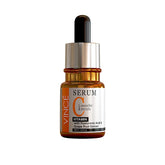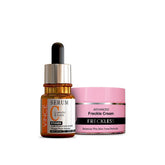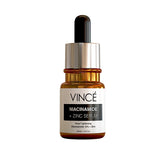Sensitive Skin: Symptoms, Common Triggers & How It's Treated
Amidst our life's daily challenges, such as financial issues, educational endeavors, and family concerns, individuals with sensitive skin have one more worrying factor – why is my skin so sensitive suddenly?
Embrace your look and gain an insight into what causes skin sensitivity instead of letting the signs of sensitive skin push you into a shell.
From demystifying common triggers to offering practical treatment tips, this article will nurture your understanding of sensitive skin care practices and burst the bubble of myths and misconceptions.
Is Your Skin Trying To Convey a Message?
Sensitive skin is not a disease but rather a signal that something is going wrong in your body, whether it is due to environmental influences or health conditions. Mostly, the warning signs of possessing sensitive skin become apparent after the skin is exposed to cosmetic products, or other triggers and manifests symptoms, including itching and red spots.
Sensitive skin definition
A skin state of observing redness, itching, or irritation initiated in response to external factors, including skin care products, food allergies, or environmental factors.
Sensitive skin necessitates gentle and tailored care to maintain skin health. The skin demands skin care products, whether face wash, moisturizers, or sunblock, labeled as “suitable for sensitive skin” as they are crafted with precautions excluding all the ingredients that might trigger a potential reaction.
Notable Sensitive Skin Symptoms
Individuals often get confused when their skin suddenly becomes sensitive and itchy. It can be attributed to various reasons, but sensitive skin has a language of its own, and people with sensitive skin have to recognize their skin’s warning signals.
Your skin gives you the silent message by unveiling a few symptoms, and the following are the commonly reported signals often observed in people with sensitive skin:
- Skin exhibiting redness, swelling, and itching with probable signs of swelling
- Sensation of stinging or burning
- Presence of rashes or hives on the skin
- Dry skin prone to cracking, blistering, or bleeding
- Dry and stiff areas on the skin with a leathery feel
Common Triggers Impacting Sensitive Skin
1. Environmental Factors
Exposure to harsh weather conditions, humidity, and ultraviolet radiation can trigger adverse reactions, leading to redness, irritation, and discomfort.
Moreover, Pollution is another common factor these days and a key factor responsible for making your skin reactive. Sun exposure demands the usage of a reliable sunblock tailor-made for sensitive skin.
Additionally, many individuals found this condition of initiating a reaction when the temperature either drops below or rises beyond a certain threshold.
2. Dietary Factors
The influence of food extends beyond internal well-being to dictating the appearance of your skin. Not all food is for everyone; certain foods initiate an allergic reaction, resulting in redness or inflammation.
Moreover, skin sensitivity is mostly attributed to food items like dairy products, eggs, soy, wheat, and peanuts. A physician can give you a better picture of dietary products, which can trigger warning signs on consumption.

3. Psychological or Hormonal Factors
If an individual is facing mental stress or anxiety, it ultimately results in hormonal imbalance in the body. Our emotional state replicates the traumatic event on our face in the form of breaks, dryness, and itching. Whenever stressed, our body releases hormones that disrupt the balance and trigger skin inflammation.
Similarly, post-traumatic stress (PTSD) disorder is a condition developed in people after experiencing a traumatic event or extreme emotional reaction. This traumatic stress disorder ptsd is another potential trigger that results in enhanced skin sensitivity.
Summing it up, a serene and peaceful mind enjoys the benefits of rejuvenated and healthy skin.

4. Chemical Factors
Most people aren’t aware of owning sensitive skin until that product triggers an extreme reaction, be it soaps, cosmetics, or any other skincare product. With the evolution of the fashion industry, and people becoming aware of the beauty regime that skin demands, individuals face issues due to the overuse or inappropriate use of certain products.
Also, the overwhelming options in the market space make it a tedious job to select a reliable skin care product that blends perfectly with your skin type. When the ingredients that go into a skincare product are not considered, it can lead to testing and discomfort for sensitive skin.

Important: Tips for Making Your Sensitive Skin Stronger
Dermatitis: Key Cause of Sensitive Skin
Dermatitis is a skin condition with the literal meaning “inflammation of the skin” that has been further branched into many categories based on its root cause. The term dermatitis encompasses a group of skin health issues mainly triggered by an individual’s genetic makeup, an overactive immune system, and other allergies.
Out of many types that come under the umbrella of Dermatitis, the following discussion delves into the three most prevalent types with their likely triggers. Triggers also vary from person to person, and after finding the signs of sensitive skin, it is advisable to consult a dermatologist to identify the accurate source of skin sensitivity after proper examination. The potential irritants, allergens, or underway body health conditions are only achievable via thorough testing and assessment.
1. Irritant Contact Dermatitis
When the skin is exposed to any harsh chemical, environmental trigger, or substance repeatedly, these substances initiate a sensitive skin condition named Irritant contact dermatitis. The repetitive exposure of skin to these ingredients strips away or damages the outer protective layer of the skin, resulting in weaker skin that is prone to skin reactions including itching, dryness, and blisters that may ooze fluids in the worst case scenario, to name a few.

For example, detergents and soaps are ubiquitous products in every household. While some detergents are formulated to be safe for sensitive skin, others may contain harsh chemicals that can take away the outer layer of the skin, leading to undesirable symptoms.
Common Triggers
- Hot Water
- Products like soaps, detergents, cosmetic products, skin care products or sanitizers
2. Allergic Contact Dermatitis
Allergic contact dermatitis, as the name indicates, is an immune system reaction initiated when the skin is exposed to ingredients the body is allergic to. The substance that is the susceptible culprit of damaging our skin is called an allergen, and it differs from individual to individual.

As an example, there are instances where the skin becomes fragrance intolerant. Now, when the skin gets exposed to a perfume or fragrance, red patches may emerge within a few hours.
Common Triggers
- Chemicals used in soaps, beauty products, shampoos, etc.
- Some plants, like poison ivy
- Exposure to heat or UV rays
- Few metals used in jewelry like nickel
- Latex or Rubber
3. Eczema
The initial two types of contact dermatitis are caused by the body getting exposed to an irritant or an allergen. On the other hand, Eczema is a chronic sensitive skin condition name associated with a mutation in our genes. This gene variation diminishes the ability of our body to protect the skin properly, and the skin becomes susceptible to common triggers. Its main symptoms include the formation of itchy, dry patches on certain parts of the body.

Common Triggers
- Fragrances and Preservatives added to different household products
- Extreme temperatures, either hot or cold, humidity
- Food items like dairy products, eggs, soy, and nuts
- Stress
- Hormonal changes in women
4. Rosacea
It is a skin condition observed on the face and characterized by the tendency to blush and redden more quickly. The primary cause of redness is dilation of the blood vessels, that gives a sunburn look to the skin with the possibility of blood vessel visibility.

Common Triggers
- Environmental factors, either wind, sun, or extreme temperature
- Drugs
- Skin care products
- Dietary items like alcohol, spicy food, and hot drinks
- Stress
Sensitive Skin Treatment at Home
In this section, we will explore effective home remedies and practices that are designed to nurture and soothe sensitive skin. Discover natural solutions and simple routines that prioritize your skin's well-being, offering relief in the comfort of your home.
1. Moisturize Your Skin
Dryness is not merely a sign of sensitive skin, but it can eventually tend to induce sensitive skin symptoms. Dry skin, deprived of adequate moisture, becomes more likely to attract allergens and irritants that make your skin suddenly sensitive and itchy.
Opt for a reliable moisture suitable for sensitive skin and is free of all the probable harmful ingredients. Before applying moisturizer, don’t overlook the importance of sulfate-free face wash to fantasy dirt and microbes-free moisturized skin.
Ensure to moisturize your skin twice or thrice a day to avoid potential skin conditions in the future. Night-time moistening stays on the face longer, so practice moisturizing your face with Vince’s Skin Lightening Night cream. The inclusion of luxury and smooth shea butter in this night cream makes it a perfect choice to restore the hydrating, velvety sensation of your skin.

2. Limit The Use of Hot Water
Sensitive skin disapproves of prolonged exposure to hot showers. Treat a hot water bath as your adversary, as it can strip your skin of natural oils, particularly worsening conditions like eczema.
3. Gentle Drying Ritual
Refrain from being harsh on your skin and opt for soft towels after cleansing or bathing. Always choose to pat dry your skin in place of harsh rubbing. Post-washing and bathing are perfect times for your skin to receive its due moisture, so never overlook that essential step.
We often moisturize our faces and overlook the skin of our hands and feet as they also need their fair share of moisture. It’s challenging to find a cream that moisturizes your hands and feet, let alone one applicable to sensitive skin conditions. One sure shot selection will be Vince’s Soft & Glow Hand & Foot Whitening Lotion enriched with shea butter, which is sensitive skin-friendly and promises hydrated, glowing skin.

4. Pay Attention To Your Clothes
Clothes are the first barrier interacting directly with your skin. So, if you feel that your skin is suddenly sensitive to clothing, be mindful of what you are wearing. Opt for clothes that are soft to the touch, like cotton and silk. Especially avoid clothes like wool to avoid triggering the symptoms of itching, burning sensation, or blisters any further.
5. Apply Sunscreen
Everyone acknowledges the potential damage the sun’s UV light imposes on the skin, but sometimes customers casually choose a sunblock proven to be more detrimental than the sun itself. It is often because of the worst effect of reactive chemicals that can be present in the sunblock.
Vince’s lightweight UVA and UVB protector is crafted with care to address skin sensitivity and is labeled as safe for all skin types. Its formulation is composed of mineral ingredients like titanium dioxide, rather than damaging chemicals that tend to cause less irritation, especially if your skin is combating the skin condition called eczema.

6. Be Selective With Your Skin Care Products
It is the most prominent area we need to shed light on to educate people. The glamor world compels you to buy certain products not meant for you and ultimately triggers sensitive skin symptoms.
While buying cosmetics or beauty products directly interacting with our skin, be more selective with your choices. There are a few measurements or precautions we need to take to establish a healthy relationship between our sensitive skin and our beauty products:
Suitable for sensitive skin
Examine the product’s labels and discontinue applying products whether face wash, moisturizer, or any such product that is not explicitly declared safe for sensitive skin.
Patch Test
Before using a newly purchased skin care product, conduct the patch test by applying it on a smaller area to watch out for the appearance of sensitive skin symptoms, including redness and irritation. There is always probable risk in the usage of new products due to ingredients that act as potential triggers. Repeat the patch test for 7-10 days to minutely observe any possibility of skin irritation.
Elimination process
Discontinue the routine of applying skin care products for two weeks. Now, gradually reintroduce one product at a time and look out for any skin reactions. This method will help identify the specific product that is a common trigger, indicating its formulation is unsuitable for your skin type.
7. Embrace Mental And Physical Well-being
Your mental health has an impact on how you look from the outside. It needs as much attention as our skincare routine to enjoy a healthy harmony between soul and body. Be more mindful and practice daily meditation to soothe an overactive mind.
Additionally, engaging in regular physical activity helps alleviate stress. Ensure a balanced diet, avoiding food items that may trigger adverse skin reactions.
Conclusion
Skincare never works on the formula of one-size-fits-all; it demands customized care based on your skin type. For people with sensitive skin, customized treatment is based on the factors that somehow cause a selection of skin symptoms, including soreness, redness, irritation, dry patches, and burning sensation, to name a few.
The question of why my skin is so sensitive all of a sudden can have many attributing factors, including environmental factors, hormonal changes, exposure to allergens or irritants, and adverse effects of cosmetics and beauty products.
However, the effective treatment of sensitive skin varies based on the potential triggers and is cured by considering a few precautionary measures. This measure encompasses a careful, mindful approach to product selection, limiting hot water usage, and using moisturizers, sunblock, and serums.
By acknowledging potential triggers and embracing straightforward yet powerful home remedies for sensitive skin, we create a balanced connection between our skin and the external environment.
Frequently Asked Questions (FAQS)
Q. What is the main cause of sensitive skin?
Causes of sensitive skin span a broad spectrum ranging from physiological or hormonal changes to environmental factors. Various underlying skin conditions like eczema and allergic contact dermatitis can affect your skin and result in skin irritation. Harsh weather conditions, UV light, and low/high humidity can turn skin suddenly sensitive and itchy. Additionally, the inclusion of fragrances and chemical ingredients in soaps, skin care products, cosmetics, detergents, shampoos, etc can be a common trigger.
Q. Is there a cure for sensitive skin?
Sensitive skin is usually not a severe skin condition and can be addressed by making a few adjustments in the daily routines. It includes avoiding sun exposure without sunblock, opting for soft and skin-friendly clothes, and refraining from using beauty and other household products that contain harsh chemicals. Similarly, if sensitivity is linked to some underlying skin problem, consult a dermatologist to be more informed about the probable allergens, gene mutation, and irritants. Most importantly, keep your skin hydrated using a specialized moisturizing cream tailor-made for sensitive skin, like Vince’s Perfect 30’s Cream.
Q. What medication is used for sensitive skin?
The medication for sensitive skin is often related to the cause of the skin reaction that can vary widely. Usually, sensitive skin is not a serious medical condition, and simple changes in our daily routine to manage common triggers play a significant role in controlling skin sensitivity. In the acute phase of an underlying sensitive skin condition like dermatitis, some active ingredients, including anti-itching creams, sunblock, corticosteroids, and immunomodulators, are recommended to relieve adverse skin symptoms.

 KSA
KSA












